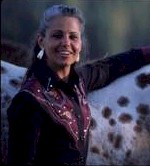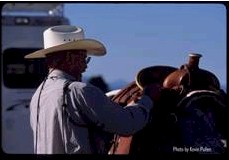Chief Joseph Trail Ride


2026 CHIEF JOSEPH TRAIL RIDE
2026 Ride Dates:
Sunday, July 19 – Saturday, July 25
Bannock Pass – Edie, ID
 Trail Ride Rules and Regulations
Trail Ride Rules and Regulations
For questions please contact:
Amber Alsterlund
530 S Asbury St Suite 3, Moscow, ID 83843
208.882.5578 Ext 264
Email: trailrides@appaloosa.com
2025 Ride Application Requirements
- Ride fees do not include ApHC membership, which is required for all attendees on all the Chief Joseph Trail Ride.
- All fees must be paid in full by the application deadline of May 15 to avoid late fees and to receive a ride t-shirt.
- A minimum $150 deposit (of which $75 is non-refundable) is required to hold a place on the trail ride and must accompany a completed application form. The non-refundable portion of deposits are non-transferable to another rider or non-rider.
- All ride participants (riders/non-riders/youth/crew) MUST submit a signed release/indemnity statement AND completed medical form by the ride deadline.
- The horse’s Declaration of Fitness, signed by a veterinarian, must be presented upon check-in at the ride. Horses will not be allowed to participate without this document on file.
- Upon check-in at the ride, you must present the horse’s Certificate of Registration (if ApHC registered), proof of negative Coggins (dated on or after July 28, 2024) and 30-day health certificate (dated on or after June 29, 2025). Make sure that Coggins and health papers list the horse’s REGISTERED name on all documents. All horses, regardless of state of origin, must have these documents.
- Applications received after the deadline will not receive awards, pins or t-shirts at the ride. Awards may be mailed after the ride, but t-shirts will not be available to those with late applications or payments
2025 Ride Application
Click on the following links to enroll in the Chief Joseph Trail Ride Online or make a payment online
Click on the following links to fill out the Declaration of Equine Fitness form (required for each horse) or the paper version of the Chief Joseph Trial Ride Application
Links of Interest
- Riding The Chief Joseph Trail Ride 1965
- Trail Ride Rules and Regulations
- Preparing for an ApHC Trail Ride
- Tips to Prevent Colic and Dehydration
- Nez Perce Trail Foundation
- INSTAGRAM: @chiefjosephtrailride
- FACEBOOK PAGE: Chief Joseph Trail Ride, Inc. 501c3
- FACEBOOK GROUP: Chief Joseph Trail Riders
State Import/Export Health Requirements
Be sure to check the Department of Livestock and/or Agriculture websites for the requirements of EACH state you will be traveling through or returning to.
Preparing for an ApHC Trail Ride:
You’ve decided to sign up for an ApHC trail ride. Great! Your next question may be “Now what do I do?” Here are a few tips to make the experience an enjoyable one for both you and your horse.
The Horse
Not every horse is suitable for a pleasurable trail ride. Temperament and disposition play an important role. Make sure your horse mingles well with others, and can remain calm whether he is by himself or in a large group of other horses. Some horses are competitive and may kick at others or jig all day trying to get to the front of the line. A day’s worth of this can be quite frustrating! If your horse does have a tendency to kick, be sure to tie a ribbon on his tail to warn others. The last thing we want is an injury to another horse or rider.
Tying a horse to your trailer is always handy. However, you may be required to tie to the picket lines that are provided on the Chief Joseph Trail Ride. Regardless of how your horse may be tethered for the evening, make certain he can stand quietly amongst other horses. At mealtimes it is suggested that horses are fed away from the group, and brought to the picket line after they have finished their meal.
Ensure the tack you bring for the horse fits securely and properly. It should be checked for any tears or other wear which may cause harm to the horse or you during a full day’s ride. Extra padding to avoid sore backs and rub spots should be considered. We want to avoid causing a sore horse.
Temperatures may vary greatly between day and night. It would be beneficial to provide your horse with a light to medium blanket to wear at night. A waterproof blanket would be the best. Keeping your horse from getting chilled could help guard against stiff, sore muscles and general fatigue.
Be prepared for a horse that may go off of his feed and water when they travel and are in unfamiliar surroundings. Get your horse used to drinking from natural water sources. Electrolytes may help to keep him properly hydrated during the week. Using the same water and feed buckets you do at home may also help.
Some rides require you to bring your own feed, however any feed you bring should be certified weed-free. There are very strict regulations for the areas in which we ride during the Chief Joseph. To help stop the spread of noxious weeds, the ApHC provides certified weed-free hay for your horse. Grass hay is well accepted by most horses and helps prevent colic. Be wary of switching feeds suddenly as this can lead to colic. Allow your equine pal to adjust by introducing a new feed gradually over several weeks.
Have your veterinarian give your horse a thorough check up several weeks in advance. She or he may be able to determine if your horse is physically fit and sound enough to attend the ride. You will be required to have a Certificate of Veterinary Inspection (Health Certificate) as well as a negative Coggins test to attend the ride anyway, so you can have this all done at the same time.
If shoeing, have your horse shod at least two weeks prior to the ride. Explain to your farrier that you will be riding a week through difficult terrain. You may want to consider having pads placed on your horse’s front feet to guard against stone bruises. Today’s hoof boots also offer good protection.
Finally, make certain your horse is properly conditioned. You may run the risk of seriously injuring your horse if you do not physically prepare him for five full days of riding. While these are not endurance rides, some portions of the trail may be difficult. There may be steep inclines and declines, water crossings, obstacles and high temperatures. Five consecutive days of trail riding is hard on an unconditioned horse. It would be unfortunate if the ride veterinarian had to tell you that your horse could not continue. A general rule is that your horse should be ridden at least 10 miles per session, 3 times a week, at least 4 weeks prior to the ride. Beware of bringing overweight horses. A horse’s ribs should be easily felt under the skin. If you cannot feel the ribs, your horse is overweight and will be prone to heat exhaustion and colic.
The Rider
It is equally important for the rider to be conditioned and prepared for a week of camping and riding. The time spent conditioning your horse is good, but riding even more frequently is better – for both of you. You should be comfortable spending up to 6 hours at a time in the saddle. Keep in mind that the saddle you enjoy riding for a short time in the arena may become your worst enemy after a few hours on the trail.

Come prepared for any type of weather. The ApHC trail rides take place during different times of the year and sometimes in different climates. Weather is unpredictable; be prepared. Make certain you carry your raincoat, and layer your clothes appropriately. Even during midsummer, the temperature may be very cold at night and hot during the day. Rain or even snow is possible, depending on the location.
Wear boots or riding shoes that will be comfortable to walk in and safe to ride in. You may be riding in the rain and walking through mud. Cold wet feet can make you miserable.
Sunscreen, insect repellent and a brimmed hat that covers your face are highly recommended. It is easy to become overheated during the course of the day, especially at some of the high altitudes and high temperatures we ride in. Gnats and mosquitoes could be a big problem, too, so be sure you pack enough repellent to get you through the week – for yourself and your horse.
Even though the ApHC provides you with a sack lunch to carry with you on the trail, you may want to take a few extra snacks. Trail mix, crackers and protein bars are easy to carry in your saddle bag. Be sure to hold on to your trash, disposing it in camp at the end of the day.
Dehydration affects humans and horses alike, so if you don’t already have one, acquire a good canteen or water bottle. Frequent drinks of water will keep you refreshed, and prevent a visit to the ride physician. Carrying a collapsible water dish and extra water for your horse is a good idea.
Lastly, discuss with the ride physician any special health concerns you may have. Most problems can be avoided with the physician’s prior knowledge.
Gear
You have the tack for your horse, and the clothes you need to wear. What else? Much of this depends on your choice between sleeping in a tent or in a self-contained camper.
The Chief Joseph Trail Ride is a progressive ride where the evening’s camp is moved each day. Riders take off in the morning while the camp crew and drivers move the vehicles in a caravan to the next site. If you tent, tear down your gear, put it in the designated place, and the ApHC will transport it for you. If you have a vehicle, you must provide a separate driver to move your rig to the next site. Because of space limitations, it is a good idea to share vehicle accommodations whenever possible. Not every site is easily accessible, so leave those big motor homes and large living quarter horse trailers at home. There will be restrictions on size and number of vehicles from year to year, so check with the Trail Coordinator before committing to a rig.
The base camp rides stay in one place, so you will be able to tent, stay in your horse trailer, or bring your motor home without worrying about getting to the next camp site. The camping area could still be tight, so speak with the ride manager or coordinator ahead of time about accessibility and restrictions.
Check your gear prior to the ride. Set up your tent and inspect it. Is your sleeping bag clean? Check for any holes and leaks in your air mattress. Make certain you will stay warm and dry if there is a downpour or if the temperatures drop significantly in the evenings.
Since electricity is not available and facilities are usually not provided, you may have to be creative when it comes to cleaning up each day. Solar showers come in very handy in this situation. The ApHC usually provides both potable and non-potable water for the duration of the ride, but that may vary depending on the year. Fill up solar shower bags in the morning, set it in the direct sun and a nice shower will be waiting for you when you get back to camp. Don’t forget the soap, cloth and towel.
A folding camp or lawn chair will increase your comfort for mealtimes, programs and when relaxing around the campfire.
Don’t overburden yourself with a lot of unneeded gear. The bare essentials you need to be comfortable will do just fine. The list could be quite large, but a few necessary items may be – sunglasses, gloves, camera, flashlight and batteries, miscellaneous toiletries and an alarm clock.
Don’t forget to check your vehicle. Oil and other fluids, belts, hoses and tires need to be checked. Make certain your spare is in good working condition for both the truck and trailer. Anything can happen at any time, but an ounce of prevention really is worth a pound of cure.
Hit the Trail
Now you should have a pretty good idea of what it takes to attend an ApHC trail ride. Use these tips as a guide, adjusting them your personal situation. No one knows you or your horse’s needs better than you!
If you are ready to experience the fun of trail riding, nothing is better than attending one the ApHC’s rides. You will make new friends, see beautiful scenery, and return home with memories to last a lifetime. You and your horse just may have the ride of your life!
For more information please contact:
Amber Alsterlund
530 S Asbury St Suite 3, Moscow, ID 83843
208-882-5578 x 264
Email: trailrides@appaloosa.com


